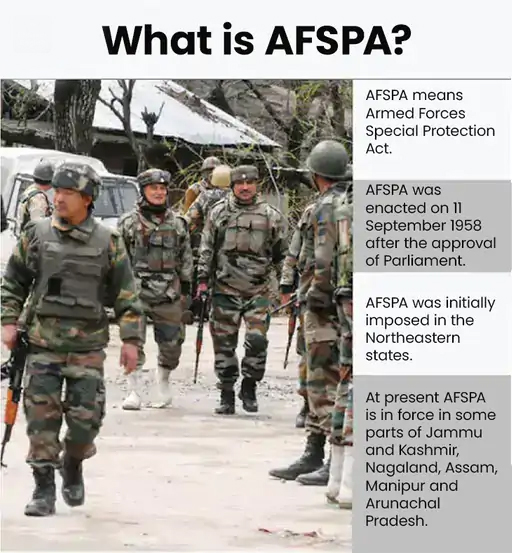Context:
Recently, The Union Ministry of Home Affairs (MHA) has announced a six-month extension of the Armed Forces (Special Powers) Act (AFSPA) in select regions of Manipur, Nagaland, and Arunachal Pradesh, effective from October 1, 2025. The extension aims to maintain law and order and address ongoing insurgent activities.
What the Extension Means:
· Most of Manipur is declared a “disturbed area under section 3 of AFSPA,” excluding some police station jurisdictions in five districts (Imphal West, Imphal East, Thoubal, Bishnupur, Kakching).
· In Nagaland, eight districts and 21 police station areas in five other districts remain under the AFSPA “disturbed areas” classification.
· In Arunachal Pradesh, the districts of Tirap, Changlang, Longding, plus certain police stations in Namsai district, are similarly under “disturbed area” status.
Implications
· forces can Search and arrest without warrant under certain conditions.
· Use of lethal force under prescribed conditions (if necessary for maintaining public order or in counter-insurgency operations).
· Greater legal protection / procedural immunity for security personnel in carrying out operations under AFSPA.
About Armed Forces (Special Powers) Act, 1958:
AFSPA is an Indian law enacted by Parliament on 11 September 1958. Originally, it was known as the Armed Forces (Assam and Manipur) Special Powers Act, 1958. Over time, its territorial scope was expanded and the name was changed to Armed Forces (Special Powers) Act, 1958.
Purpose:
The Act was introduced to empower the armed forces to maintain law and order (or public order) in “disturbed areas” where civil administration is unable to handle insurgency, internal conflict, or serious unrest.
Key Provisions:
Some of the key features and powers under AFSPA include:
|
Provision |
Description |
|
Declaration of disturbed area |
Under Section 3, the State Governor or the Central Government can declare any part of a state or a union territory a "disturbed area" by issuing a notification. This declaration triggers the application of AFSPA in that area. |
|
Use of force (Section 4) |
In a disturbed area, authorized armed forces personnel have the power to use force, even to the point of causing death, under certain conditions. For example: if a person is violating prohibitory orders; or carrying arms; or assembly of persons is prohibited. A warning is to be given “if possible” before opening fire. |
|
Arrest and search without warrant |
The law allows the armed forces to arrest a person without a warrant on “reasonable suspicion,” and also to enter and search premises without a warrant, if needed, to recover weapons, etc. |
|
Legal immunity / sanction requirement |
Section 6 and other parts of the Act provide a degree of legal protection: security forces acting under AFSPA typically require prior sanction from the central government for prosecutions. This makes it harder to bring legal action against them. |
Conclusion:
The six‑month extension of AFSPA in parts of Manipur, Nagaland, and Arunachal Pradesh underscores that the government assesses the security situation in these areas still to be fragile and requires extraordinary measures. While these measures may help strengthen enforcement and deter violence, they also bring substantial risks of human rights concerns, social alienation, and political backlash if used without care, oversight, and proper engagement with local communities.







